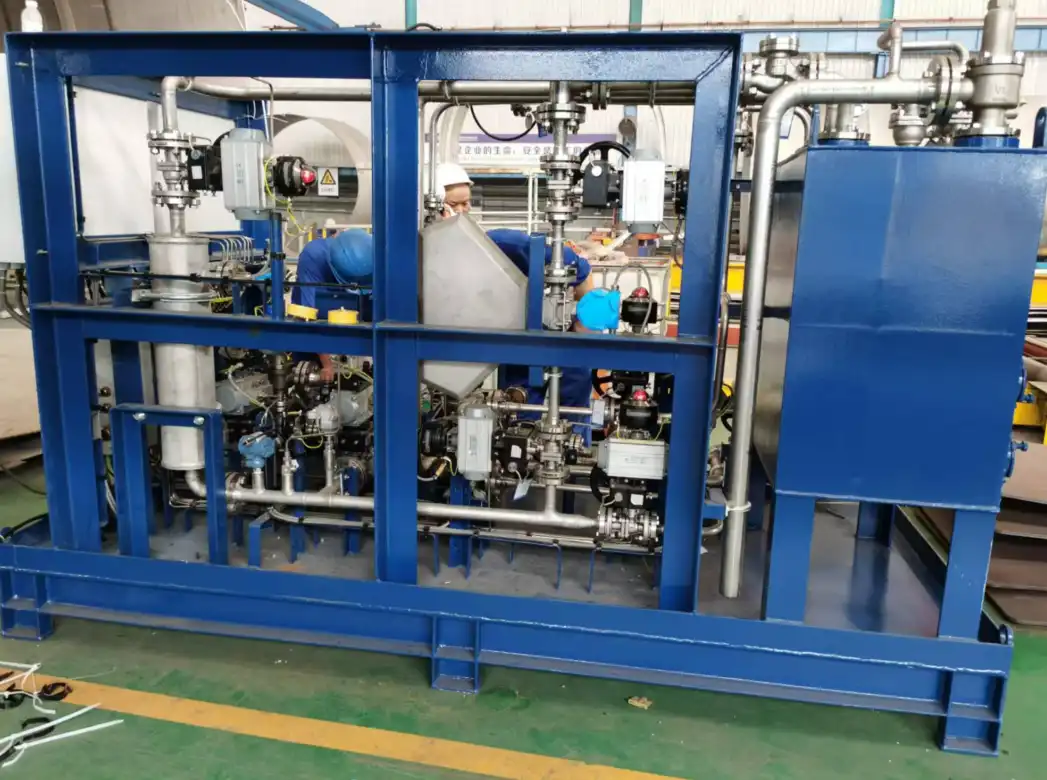Automated MFSS technology precisely controls methanol flow, adjusts fuel mixtures, and monitors system health in real-time. This level of automation not only enhances fuel efficiency but also ensures compliance with stringent environmental regulations. By leveraging advanced sensors, control algorithms, and predictive maintenance techniques, automated methanol fuel systems optimize engine performance while reducing the workload on crew members. The integration of automation in methanol fuel systems addresses several key challenges in marine propulsion, including fuel quality consistency, system reliability, and operational safety. As the maritime industry increasingly adopts methanol as a sustainable fuel option, the role of automation becomes even more critical in realizing its full potential.

Real-time monitoring: Optimizing methanol consumption
Real-time monitoring is a cornerstone of efficient methanol fuel system automation. Advanced sensors and data analytics work in tandem to provide continuous insights into fuel consumption patterns, engine performance, and environmental conditions. This constant stream of information allows for immediate adjustments to optimize methanol usage.
Precision fuel management
Automated systems integrated with the Methanol Fuel Supply System use real-time data to continuously adjust and fine-tune methanol injection rates. This ensures that engines receive the precise amount of fuel needed under varying operational conditions, from low-load to high-load scenarios. By maintaining this level of precision, the system optimizes fuel consumption, leading to significant improvements in fuel efficiency. As a result, vessels can reduce overall fuel usage, minimize wastage, and lower operating costs. This level of control also helps to extend the lifespan of engine components by preventing overconsumption and maintaining optimal performance.
Environmental compliance tracking
In the maritime industry, environmental regulations are becoming more stringent. The Methanol Fuel Supply System is equipped with advanced real-time monitoring features that track exhaust emissions, ensuring compliance with international maritime environmental standards. By continuously measuring emissions, the system can quickly identify any deviations from compliance and make immediate adjustments. This helps prevent costly fines and ensures that vessels adhere to both local and global environmental regulations, significantly contributing to reducing the carbon footprint of the shipping industry.
Performance optimization
By analyzing real-time data on engine performance, the system can identify opportunities to maximize fuel efficiency and power output while minimizing emissions. This includes making adjustments to fuel mixtures, engine timing, and other critical parameters to ensure that the engine operates at its peak efficiency. Whether it’s improving acceleration, optimizing fuel burn during long voyages, or reducing fuel consumption at cruising speeds, the system continuously adapts to ensure that the vessel runs smoothly and sustainably, driving both performance and environmental benefits.
Automated fuel mixing: Ensuring optimal performance
Automated fuel mixing is a critical component of efficient methanol fuel systems. This process ensures that the methanol-water mixture is consistently maintained at the optimal ratio for engine performance and emissions control.
Adaptive mixing algorithms
Advanced algorithms in the Methanol Fuel Supply System adjust the methanol-water ratio in real-time based on various factors such as engine load, ambient temperature, and humidity. This adaptive approach ensures that the fuel mixture is always optimized for current operating conditions.
Quality control automation
Automated systems continuously monitor fuel quality parameters such as density, conductivity, and water content. Any deviations from the required specifications trigger immediate adjustments or alerts, ensuring consistent fuel quality and protecting engine components.
Seamless transition between fuel modes
For dual-fuel engines, automated systems manage the transition between methanol and conventional fuels seamlessly. This capability is crucial for vessels operating in different emission control areas or when methanol availability varies.
Predictive maintenance: Reducing downtime in methanol systems
Predictive maintenance is a game-changing aspect of methanol fuel system automation. By anticipating potential issues before they occur, these systems significantly reduce unplanned downtime and extend equipment lifespan.
Advanced diagnostics
Automated Methanol Fuel Supply Systems employ sophisticated diagnostic tools that continuously monitor system components. These tools can detect subtle changes in performance that may indicate impending failures, allowing for proactive maintenance scheduling.
Machine learning integration
Many modern MFSS incorporate machine learning algorithms that analyze historical data to predict maintenance needs. These systems become increasingly accurate over time, optimizing maintenance schedules and reducing unnecessary interventions.
Remote monitoring and support
Automated systems often include remote monitoring capabilities, allowing onshore technical teams to provide real-time support and diagnostics. This feature is particularly valuable for vessels operating in remote locations, ensuring rapid response to potential issues.
Lifecycle optimization
By tracking component performance and wear patterns, predictive maintenance systems can optimize the lifecycle of critical MFSS components. This approach not only reduces downtime but also lowers overall maintenance costs and extends system longevity.
Call to Action: Elevate Your Fleet with CM Energy's Advanced MFSS Solutions
As the maritime industry navigates towards a cleaner, more efficient future, CM Energy stands at the forefront of methanol fuel system innovation. Our advanced MFSS supplier solutions offer unparalleled automation, ensuring optimal performance, reduced downtime, and seamless compliance with environmental regulations. With a proven track record in delivering cutting-edge methanol fuel systems, CM Energy is your trusted partner in marine propulsion technology.
Experience the future of maritime efficiency with TSC's state-of-the-art Methanol Fuel Supply Systems. Our comprehensive solutions, backed by industry-leading expertise and a commitment to innovation, are designed to meet the unique needs of your fleet. From real-time monitoring to predictive maintenance, TSC's MFSS technology offers a complete package for vessels of all sizes.
Don't let your fleet fall behind in the race towards sustainable, efficient marine operations. Contact CM Energy today to learn how our advanced MFSS solutions can transform your vessels' performance and environmental footprint. Reach out to our team of experts at info.cn@cm-energy.com and take the first step towards a more efficient, sustainable future for your maritime operations.
